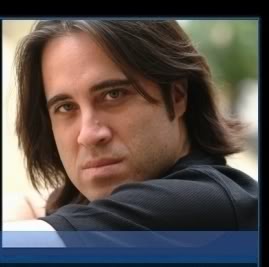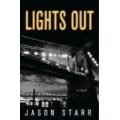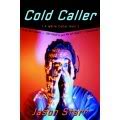AUTHOR INTERVIEW: Jason Starr, Part Two
By Writer Unboxed | October 13, 2006 | Comments Off on AUTHOR INTERVIEW: Jason Starr, Part Two
 Therese and I are pleased to present the second half of our interview with noir/crime fiction author Jason Starr. Starr has garnered raves and awards for his edgy novels laced with biting wit and a ripping pace, but, as he noted in Part One of our interview, the road to publication was neither easy nor quick.
Therese and I are pleased to present the second half of our interview with noir/crime fiction author Jason Starr. Starr has garnered raves and awards for his edgy novels laced with biting wit and a ripping pace, but, as he noted in Part One of our interview, the road to publication was neither easy nor quick.
Q: After college you wrote plays. Do you think being a playwright was helpful in crafting novels?
JS: Absolutely. I’m not the only crime writer who started with playwriting–I know Charlie Stella and some others started in the theater as well. In a play, you are forced to tell an entire story with dialogue. The dialogue has to be strong, gripping, all the way through, or you lose your audience. In novels, of course, plotting is very important, but I think for learning how to build tension within scenes playwriting is great training.
Q: Could you elaborate a bit about the kinds of plays you wrote and how that taught you to milk the scene for tension? Were there other lessons you learned from crafting plays other than dialogue-driven action? JS: My plays were character driven, and sometimes had a “theater of the absurd” element as I was really into Beckett and Ionesco at the time. I also loved Pinter and Mamet so I wrote a lot of what I guess you can call “pseudo Mamet.” I don’t think I wrote any really worthwhile plays though. I always felt constrained by plays and when I started writing novels it really opened things up for me. I could get into the psychology of the characters more, have more expansive plots. But in a play language has to be very concise because you’re always in danger of losing the audience’s attention, and this is another thing I’ve tried to carry over to my novels.
Q: Your writing style is fast-paced and edgy. Does this reflect your Brooklyn roots? How does place suggest the story for you?
JS: I’ve lived in New York all my life and, yes, I think it has affected my style. I think there is an edgy, sarcastic voice in my writing, which is the New Yorker in me coming out. Regarding a fast pace, that’s something I work on a lot. There is lot of competition for readers’ attention, from TV, movies and other books, so I know I have to grip readers from the get-go.
Q: Do you mind sharing a few tricks and techniques to ensure your prose rips along?
JS: Cutting is very important. I overwrite usually and then cut my books down by about 50-100 pages sometimes to keep the pace fast. Over the years, my wife has had a great eye for helping to cut down my books. I also think about pace a lot while I’m writing and I try to include anything extraneous. I always ask myself, Is this important? Do I really need this? I also do a lot of cutting within sentences and paragraphs, always trying to find the simplest way to get a point across.
Q: What’s your writing process? Are you a plotter, or do you prefer to let things evolve?
JS: It’s a combination really. I always have what I like to call and evolving plot. From the very beginning I have a sense of the ending and other major plot points. This changes as I go along but I always have to know where I’m going.
Q: Do you have an organization process for your brainstorms? Write them on napkins or shower walls? Do you sit down at some point and junk some threads and concentrate on others?
JS: I usually don’t right them down, figuring if it’s a really good idea I’ll remember it. I mean, I used to wake up in the middle of the night and scribble down ideas, but in the morning I’d usually realize how bad, even nonsensical they were. When I’m writing, I cut and paste a lot, move stuff around electronically. And, yes, some plot points don’t go anywhere and need to be junked in the end.
Q: How have you evolved as an author?
 JS: My early novels were straight ahead noir-crime novels, and now I’m moving toward urban crime novels and thrillers. Lights Out is my most complex book to date and my next novel–due next year from St. Martin’s–is an even greater departure. I think I’ll continue to push in new directions.
JS: My early novels were straight ahead noir-crime novels, and now I’m moving toward urban crime novels and thrillers. Lights Out is my most complex book to date and my next novel–due next year from St. Martin’s–is an even greater departure. I think I’ll continue to push in new directions.
Q: What is the best advice you have ever received during your writing career? The worst?
JS: Best advice: To write what I want to write. Worst advice: to put my first novel, which ultimately sold in 10 languages and is currently in development as a film, in the drawer and write something else. An agent I approached ten years ago actually suggested I do this, even though I’d already sold the book in the U.K.! I still have the note.
Q: What the…? What could be easier than selling the rights to a book that’s already pubbed? What made you reject that advice and pursue a U.S. publisher? Did it teach you anything about the publishing business that you already didn’t know from the years of rejection?
JS: Well, I had already sold world rights to the book to my UK publisher, which made the “advice” even more moronic. I wasn’t showing this agent a possible project–I was just showing him a sample of my writing–and my UK publisher was going to go on and sell rights anyway (not, in every case, an easy thing to do because the book has to have wide enough appeal for different territories). It taught me that this wasn’t the right agent for my work and I was thankful that he revealed his hand early.
Q: With seven releases under your belt, this might be a non-issue for you, but do you get writer’s block? If so, how do you overcome it?
JS: I’m usually working on a few projects at a time, and do a lot of plotting as I write, so this is a pretty good way to avoid writer’s block. If a scene isn’t working for me, I just jump ahead and work on a different scene in the book, then go back to the more difficult scene later on.
Q: How did you feel upon learning that your debut novel was going to be made into a film? Since you are trained as a playwright, did you write the screenplay? How does it feel knowing characters you created are going to be played by actors?
 JS: A few of my books are currently under option, including Cold Caller. Cold Caller had been optioned previously, by one of the producers of Fight Club. Unfortunately it didn’t get going that time around, but last year the material was optioned again, this time by Smoking Gun Productions in Australia and I was hired to write the screenplay (setting the action in Sydney). The material has translated really well to the new setting. I was recently in Australia to work on it and we’re very excited about the project, which is being financed by the South Australian Film Corporation (SAFC) and seems to have a good chance of going into production in 2007. Will be a blast to see actors do the film, particularly since I wrote the screenplay. I remember how surreal it used to seem when actors performed my plays.
JS: A few of my books are currently under option, including Cold Caller. Cold Caller had been optioned previously, by one of the producers of Fight Club. Unfortunately it didn’t get going that time around, but last year the material was optioned again, this time by Smoking Gun Productions in Australia and I was hired to write the screenplay (setting the action in Sydney). The material has translated really well to the new setting. I was recently in Australia to work on it and we’re very excited about the project, which is being financed by the South Australian Film Corporation (SAFC) and seems to have a good chance of going into production in 2007. Will be a blast to see actors do the film, particularly since I wrote the screenplay. I remember how surreal it used to seem when actors performed my plays.
Q: What are you reading right now?
JS: Lost Lake by Phillip Margolin, Garden of Beasts by Jeffery Deaver, Border Street by Suzanne Leal. A mix of crime and literary–all great reads. Thank you, Jason!
LIGHTS OUT is now available in bricks-n-mortar and online booksellers everywhere.









